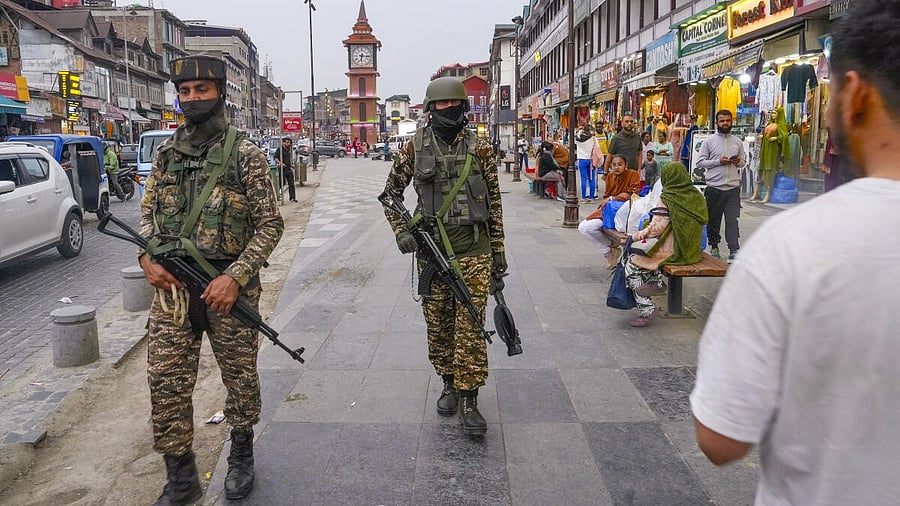
Security personnel keep vigil amid high alert, in the aftermath of the Pahalgam terror attack, in Srinagar.
credit: PTI Photo
Srinagar: A simple phone charger turned out to be the crucial clue that helped the Jammu and Kashmir Police track down and arrest a man accused of aiding the terrorists behind the April 22 Pahalgam terror attack, which left 25 tourists and one local resident dead, sources said.
The accused, Mohammad Yousuf Katari (26), a school teacher from Kulgam, was arrested in September after investigators established his links with the Pakistan-based Lashkar-e-Taiba (LeT) and his role as an overground worker (OGW) who provided logistical support to the terrorists involved in the massacre.
They said Katari was zeroed in on after an analysis of equipment and weapons recovered from the LeT terrorists killed during Operation Mahadev, a prolonged counter-terror operation launched on May 22 after intelligence inputs about militant presence in the Dachigam area near Srinagar.
The operation, which lasted several weeks, culminated in the killing of three foreign terrorists - Sulieman alias Asif, Jibran, and Hamza Afghani - including the mastermind of the Pahalgam attack.
From their hideout in the foothills of the Zabarwan Range, security forces recovered AK-47 and M9 assault rifles, later sent to a forensic laboratory in Chandigarh. The ballistic analysis confirmed that the weapons had been used in the Pahalgam killings.
Amid the debris of the encounter site, investigators recovered a partially damaged Android charger - a small piece of evidence that would prove decisive, sources said. Forensic experts traced the charger’s serial number through the manufacturing and purchase trail, which led to a Srinagar-based mobile dealer.
From there, the trail found its way to Katari, who had allegedly purchased and later provided it to the terrorists during one of their meetings in the Zabarwan hills, they added.
Police said Katari had met the trio on at least four occasions, providing supplies, guidance through forest routes, and technical support, including the charger that eventually linked him to the network.
Investigators believe Katari was part of a local support module of the LeT, operating in south Kashmir’s Kulgam and extending assistance to groups hiding in central Kashmir’s forests. His arrest, officials said, has given police vital leads into the logistics chain that helped foreign militants move and operate across districts.
“The arrest shows how minute forensic evidence, when pursued systematically, can unravel an entire terror support network,” a senior officer said, adding that the case demonstrates the growing effectiveness of evidence-led policing in Jammu and Kashmir’s anti-terror operations.
Katari remains in custody as police continue to investigate the wider LeT network involved in the Pahalgam attack - an assault that shook the Valley’s fragile sense of security and left a deep scar on the region’s tourism sector.